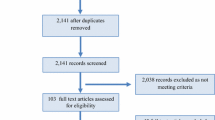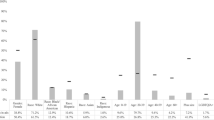Abstract
Purpose of Review
This article investigates the role of food and beverage sponsorship of sports in influencing dietary behaviour, and ultimately obesity, focusing on research published in the past 5 years. A systematic strategy was used to search the health science, social science and marketing databases to identify peer-reviewed literature on food and non-alcoholic beverage company sponsorship of sport published in English from 2015 to 2019.
Recent Findings
Sixteen discrete studies were identified: six content analyses, two qualitative studies, four cross-sectional surveys and four experimental studies. Findings indicate sports sponsorship is widely used to promote unhealthy foods through professional and community sport, prompting increased awareness and preference for sponsor products. Most studies assessed self-reported responses to sponsorship, with a lack of behavioural data on food purchasing and consumption.
Summary
Sports sponsorship by unhealthy food brands achieves vast population reach and exposure, promoting increased brand awareness and preference for sponsor products. Research is needed to improve our understanding of the relationship between food and beverage sponsorship and energy intake. Research evaluating the efficacy of strategies to reduce spectator’s exposure to unhealthy sports sponsorship is also needed.

Similar content being viewed by others
References
Papers of particular interest, published recently, have been highlighted as: • Of importance •• Of major importance
World Health Organization. Set of recommendations on the marketing of foods and non-alcoholic beverages to children. Geneva, Switzerland: World Health Organization; 2010.
Cairns G, Angus K, Hastings G. The extent, nature and effects of food promotion to children: a review of the evidence to December 2008. Institute for Social Marketing, University of Stirling & The Open University, United Kingdom, Prepared for: World Health Organization; 2009.
Cairns G, Angus K, Hastings G, et al. Systematic reviews of the evidence on the nature, extent and effects of food marketing to children. A retrospective summary. Appetite. 2013;62:209–15.
Kelly B, Baur LA, Bauman AE, et al. Tobacco and alcohol sponsorship of sporting events provide insights about how food and beverage sponsorship may affect children’s health. Health Promot J Austr. 2011;22(2):91–6.
•• Bragg MA, Roberto CA, Harris JL, et al. Marketing food and beverages to youth through sports. J Adolesc Health. 2018;62(1):5–13. This paper provides a comprehensive literature review on sports-related food and beverage marketing that encompasses sports sponsorships, athlete endorsements and sports video games. The authors conclude that athletes and sports organisations should stop promoting unhealthy foods and beverages and work with health experts to encourage healthy eating habits among youth.
The International Olympic Committee. IOC and McDonald’s mutually agree to end worldwide TOP partnership. 2017 [May 29, 2019]; Available from: https://www.olympic.org/news/ioc-and-mcdonalds-mutually-agree-to-end-worldwide-top-partnership.
Hepburn M. Timeline: History of The Coca-Cola Company and the Olympic Games. The Coca-Cola Company; 2015 [May 24, 2019]; Available from: https://www.coca-cola.co.uk/stories/making-history-with-the-olympic-games.
Hepburn M. Timeline: History of Coca-Cola and the FIFA World CupTM. The Coca-Cola Company; 2017 [May 24, 2019]; Available from: https://www.coca-colacompany.com/stories/timeline-history-of-coca-cola-and-the-fifa-world-cup.
Carter MA, Edwards R, Signal L, et al. Availability and marketing of food and beverages to children through sports settings: a systematic review. Public Health Nutr. 2012;15(8):1373–9.
Meenaghan T. The role of sponsorship in the marketing communications mix. Int J Advert. 1991;10(1):35–47.
• Kubacki K, Hurley E, Rundle-Thiele SR. A systematic review of sports sponsorship for public health and social marketing. J Soc Mark. 2018;8(1):24–39. This paper provides a systematic review on the use of sports sponsorship in public health and social marketing, with results indicating that sport sponsorship can be used to influence policy and raise awareness.
Hawkes C. Marketing food to children: the global regulatory environment. Geneva, Switzerland: World Health Organization; 2004.
Cornwell TB, Weeks CS, Roy DP. Sponsorship-linked marketing: opening the black box. J Advert. 2005;34(2):21–42.
Meenaghan T. Understanding sponsorship effects. Psychol Mark. 2001;18(2):95–122.
McDonald's. The FA Community Shield. 2019 [July 18, 2019]; Available from: https://www.mcdonalds.com/gb/en-gb/football/community-shield.html.
Smits T, Vandebosch H, Neyens E, et al. The persuasiveness of child-targeted endorsement strategies: a systematic review. In: Cohen EL, editor. Communication Yearbook 39: Routledge; 2015.
Boyland EJ, Harrold JA, Dovey TM, et al. Food choice and overconsumption: effect of a premium sports celebrity endorser. J Pediatr. 2013;163:339–43.
Ko YJ, Chang Y, Park C, et al. Determinants of consumer attitude toward corporate sponsors: a comparison between a profit and nonprofit sport event sponsorship. J Consum Behav. 2017;16(2):176–86.
Macniven R, Kelly B, King L. Unhealthy product sponsorship of Australian national and state sports organisations. Health Promot J Austr. 2015;26(1):52–6.
Watson WL, Brunner R, Wellard L, et al. Sponsorship of junior sport development programs in Australia. Aust N Z J Public Health. 2016;40(4):326–8.
Bragg MA, Miller AN, Roberto CA, et al. Sports sponsorships of food and nonalcoholic beverages. Pediatrics. 2018;141(4):e20172822.
Prowse RJL, Naylor PJ, Olstad DL, et al. Food marketing in recreational sport settings in Canada: a cross-sectional audit in different policy environments using the Food and beverage Marketing Assessment Tool for Settings (FoodMATS). Int J Behav Nutr Phys Act. 2018;15(1):39.
Sartori A, Stoneham M, Edmunds M. Unhealthy sponsorship in sport: a case study of the AFL. Aust N Z J Public Health. 2018;42(5):474–9.
Vassallo AJ, Kelly B, Zhang L, et al. Junk food marketing on Instagram: content analysis. JMIR Public Health Surveill. 2018;4(2):e54.
Bestman A, Thomas SL, Randle M, et al. Children’s implicit recall of junk food, alcohol and gambling sponsorship in Australian sport. BMC Public Health. 2015;15(1):1022.
Dixon H, Scully M, Wakefield M, et al. Community junior sport sponsorship: an online experiment assessing children’s responses to unhealthy food v. pro-health sponsorship options. Public Health Nutr. 2018;21(6):1176–85.
Dixon H, Scully M, Wakefield M, et al. The impact of unhealthy food sponsorship vs. pro-health sponsorship models on young adults’ food preferences: a randomised controlled trial. BMC Public Health. 2018;18(1):1399.
Hammond D, Reid JL. Exposure and perceptions of marketing for caffeinated energy drinks among young Canadians. Public Health Nutr. 2018;21(3):535–42.
Kelly B, Freeman B, King L, et al. The normative power of food promotions: Australian children’s attachments to unhealthy food brands. Public Health Nutr. 2016;19(16):2940–8.
Sainsbury E, Hendy C, Magnusson R, et al. Public support for government regulatory interventions for overweight and obesity in Australia. BMC Public Health. 2018;18(1):513.
Eddy T, Cork BC. Sponsorship antecedents and outcomes in participant sport settings. Int J Sports Mark Spons. 2019;20(1):26–42.
Donaldson A, Reimers JL, Brophy KT, et al. Barriers to rejecting junk food sponsorship in sport-a formative evaluation using concept mapping. Public Health. 2019;166:1–9.
Batty RJ, Gee S. Fast food, fizz, and funding: balancing the scales of regional sport organisation sponsorship. Sport Manag Rev(Elsevier Science). 2019;22(1):167–79.
• Brown K. Association between alcohol sports sponsorship and consumption: a systematic review. Alcohol Alcohol. 2016;51(6):747–55. This paper provides a systematic review examining the association between alcohol sports sponsorship and alcohol consumption, finding that they are positively associated.
Cohen J. A power primer. Psychol Bull. 1992;112(1):155–9.
Durlak JA. How to select, calculate, and interpret effect sizes. J Pediatr Psychol. 2009;34(9):917–28.
Chen H, Cohen P, Chen S. How big is a big odds ratio? Interpreting the magnitudes of odds ratios in epidemiological studies. Commun Stat Simulat. 2010;39(4):860–4.
Anderson CA, Bushman BJ. Psychology. The effects of media violence on society. Science. 2002;295(5564):2377–9.
Groesz LM, Levine MP, Murnen SK. The effect of experimental presentation of thin media images on body satisfaction: a meta-analytic review. Int J Eat Disord. 2002;31(1):1–16.
Dixon HG, Sargent JD. The role of entertainment media in promoting or discouraging tobacco use. In: Davis RM, Gilpin EA, Loken B, Viswanath K, Wakefield MA, editors. The role of the media in promoting and reducing tobacco use. Bethesda: U.S. Department of Health and Human Services, National Institutes of Health, National Cancer Institute. NIH Pub. NO. 07-6242; 2008. p. 357–428.
Ireland R, Chambers S, Bunn C. Exploring the relationship between Big Food corporations and professional sports clubs: a scoping review. Public Health Nutr. 2019:22(10):1888–97.
Kelly B, King ML, Chapman K, et al. A hierarchy of unhealthy food promotion effects: identifying methodological approaches and knowledge gaps. Am J Public Health. 2015;105(4):e86–95.
GBD 2017 Diet Collaborators. Health effects of dietary risks in 195 countries, 1990-2017: a systematic analysis for the Global Burden of Disease Study 2017. Lancet. 2019;393(10184):1958–72.
Kelly B, Bauman AE, Baur LA. Population estimates of Australian children’s exposure to food and beverage sponsorship of sports clubs. J Sci Med Sport. 2014;17(4):394–8.
Hawkes C. Marketing food to children: changes in the global regulatory environment 2004-2006. Geneva, Switzerland: World Health Organization; 2007.
Hawkes C, Jewell J, Allen K. A food policy package for healthy diets and the prevention of obesity and diet-related non-communicable diseases: the NOURISHING framework. Obes Rev. 2013;14(Suppl 2):159–68.
Kraak VI, Vandevijvere S, Sacks G, et al. Progress achieved in restricting the marketing of high-fat, sugary and salty food and beverage products to children. Bull World Health Organ. 2016;94(7):540–8.
Roberto CA, Swinburn B, Hawkes C, et al. Patchy progress on obesity prevention: emerging examples, entrenched barriers, and new thinking. Lancet. 2015;385(9985):2400–9.
Pettigrew S, Pescud M, Rosenberg M, et al. Public support for restrictions on fast food company sponsorship of community events. Asia Pac J Clin Nutr. 2012;21(4):609–17.
Kelly B, Baur LA, Bauman AE, et al. Views of children and parents on limiting unhealthy food, drink and alcohol sponsorship of elite and children’s sports. Public Health Nutr. 2013;16(1):130–5.
Dixon H, Scully M, Kelly B, et al. Can counter-advertising reduce pre-adolescent children’s susceptibility to front-of-package promotions on unhealthy foods? Experimental research. Soc Sci Med. 2014;116:211–9.
Dixon H, Scully M, Kelly B, et al. Counter-advertising may reduce parent's susceptibility to front-of-package promotions on unhealthy foods. J Nutr Educ Behav. 2014;46(6):467–74.
Bryan CJ, Yeager DS, Hinojosa CP. A values-alignment intervention protects adolescents from the effects of food marketing. Nat Hum Behav. 2019;3:596–603.
Author information
Authors and Affiliations
Corresponding author
Ethics declarations
Conflict of Interest
Helen Dixon, Angelyna Lee and Maree Scully declare that they have no conflict of interest.
Human and Animal Rights and Informed Consent
This article does not contain any studies with human or animal subjects performed by any of the authors.
Additional information
Publisher’s Note
Springer Nature remains neutral with regard to jurisdictional claims in published maps and institutional affiliations.
This article is part of the Topical Collection on The Obesity Epidemic: Causes and Consequences
Rights and permissions
About this article
Cite this article
Dixon, H., Lee, A. & Scully, M. Sports Sponsorship as a Cause of Obesity. Curr Obes Rep 8, 480–494 (2019). https://doi.org/10.1007/s13679-019-00363-z
Published:
Issue Date:
DOI: https://doi.org/10.1007/s13679-019-00363-z




